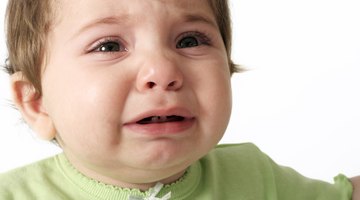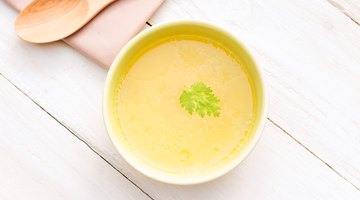Does Drinking Whole Milk Give Toddlers Diarrhea?
Once your baby reaches her first birthday, her pediatrician is likely to recommend starting whole milk. Whole milk contains fat and cholesterol, which is essential for your little one's growing brain, as well as nutrients, such as calcium, that are crucial for normal growth and development. If you've recently made this switch and also notice your toddler experiencing diarrhea, the addition of whole milk could be to blame.
The Ugly
Diarrhea is unpleasant for your child -- and for you, since you're likely the one cleaning it up. The condition is defined as stools that are looser and more watery than what's normal. If she has diarrhea, your child is likely have one of these loose, watery bowel movements more often than normal as well. There is even a condition called "toddler's diarrhea," according to BabyCenter.com. It is characterized by loose bowel movements that contain chunks of food and smell rather offensive. The cause of this condition isn't always known, but it can be in response to dietary changes, such as trying new foods.
Whole Milk to Blame?
Non-Dairy Diet for Toddlers
Learn More
If your toddler is having several bouts of diarrhea after drinking whole milk, she could be lactose-intolerant. Lactose intolerance occurs if your toddler doesn't have enough of the enzyme necessary to break down lactose, which is the type of sugar in dairy foods such as milk. Along with bloating, gas, nausea and stomach pain, diarrhea is one of the most common symptoms of lactose intolerance, according to the American Academy of Pediatrics. If you suspect that milk is to blame, try cutting it out of your child's diet for two weeks to see if symptoms improve. If the symptoms disappear, speak to your toddler's pediatrician about lactose intolerance and how to proceed.
It's Not Lactose Intolerance
If you've recently added whole milk to your toddler's diet, the diarrhea might be in response to the adjustment her digestive system must go through to adapt to dietary changes and may not be true lactose intolerance. If that's the case, her symptoms should improve fairly quickly. Symptoms that came on long after the introduction of whole milk probably signal that something else is causing the condition. According to the Children's Physician Network, your toddler might also develop diarrhea because of a viral infection.Parasites and bacteria can cause diarrhea, as can ear infections, drinking too much juice and taking certain medications.
More to Think About

Foods for Toddlers With Diaper Rash
Learn More
Most cases of diarrhea are temporary and usually go away on their own without any medical intervention. If your toddler's diarrhea came on suddenly and is accompanied by other symptoms, such as abdominal pain or a fever, this warrants a call or visit to her pediatrician. If it turns out that your toddler is indeed lactose intolerant, she might grow out of it, KidsHealth.org notes. In the meantime, your toddler won't be able to eat any dairy foods, including milk, cheese and ice cream. Talk to her pediatrician about calcium intake, since most toddlers get the majority of this essential mineral from dairy foods.








